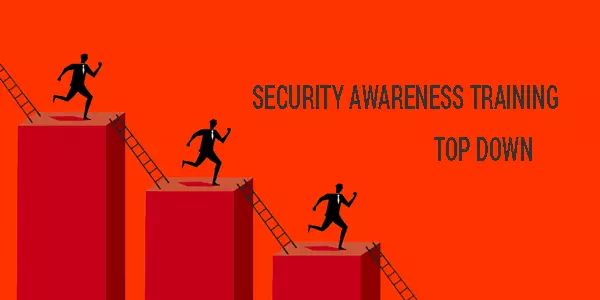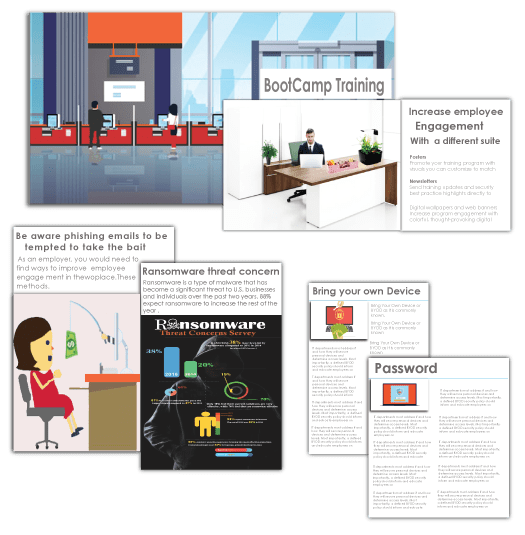Security awareness training helps get everyone in an organization on the same page, reduces risks and incidents, and helps the entire workforce protect their organization and themselves. Learn what the average employee knows, and doesn't know about cybersecurity and data privacy best practices.
-
Why should you take this course?
Enforcing a cybersecurity awareness training program is a necessary step to securing your IP and company data. But motivating your entire organization to care about cybersecurity and follow the rules is no easy feat.
we’ll show you how to build a resilient cybersecurity awareness training program that promotes better security habits and reduces risk across your organization.
-
What will you learn by taking this course?
The bottom line is simple: Nobody in your organization will care about data security, IP protection, or privacy policies until you show them why it’s important, how it impacts their roles and what they can do to prevent cyberattacks.
A comprehensive cybersecurity awareness training program should educate employees on common threats they are likely to face in their daily jobs. The length and depth of your training program may vary depending on your industry and company size.
-
About this course:
Cybersecurity has become one of the hottest topics in today's board rooms. However, many Board of Directors don't understand cybersecurity, and that is something they do not like and are not used to. Learn who makes up the typical Board member, what their priorities and concerns are, and how to communicate about cybersecurity to them. For Board members, learn the key concepts of cybersecurity and the top questions you should be asking your security officers.
-
Chapter 1: Introduction
✔️ What is cybersecurity? ✔️ What do I need to know about cybersecurity? -
Chapter 2: Cyber Attacks
✔️ How do cyber-attacks work? ✔️ Defending against cyber-attacks. -
Chapter 3: About Board Member
✔️ As a Board member, you will be targeted ✔️ What should the Board do?
-
Does anyone on the board have Information Security and Risk Management expertise?
Many information sources have begun talking about the importance of information security and risk management oversight by the board of directors. Computer and data systems were once a business enhancement – they have transitioned to business-critical tools (our ransomware experience has made this obvious). As a result, boards must be aware of the confidentiality, integrity, and availability of their data and computing services and systems. At a minimum, there should be a formal mechanism (usually a formal committee) that includes experts in information technology, security, risk management, and business to digest the current threat and risk landscape and make recommendations to address these risks to the board.
-
How do our threat intelligence activities inform our risk management decision making?
If you’re acting and tracking your actions based on threat intelligence coming in, then it will inform your risk-management decision-making process. It will help you think about your strategic plans in terms of risk from a cyber-security perspective, not just a financial one.
-
Who on the Board or in Executive Management has cybersecurity expertise?
More and more we’re seeing Boards with people that have either a technological or security background. This expertise can significantly elevate a Board's awareness. And more awareness is how we win against cybercriminals.
-
Do we base our cyber security program upon a widely accepted security framework?
When you’re writing your policies and developing your program, having a framework to base it on is very helpful. There’s no need to reinvent the wheel.
-
Do we fully understand cyber security threats and risks as they relate to our organization / institution and industry sector?
Cyber attacks are constantly evolving. Most experts agree that this trend will continue, with attacks getting more frequent and sophisticated all the time. It’s important that you stay up-to-date on the current threat environment and attack vectors. You need to know whether your organization or industry is being targeted, and how you would be impacted if an attack was successfully perpetrated.
- Key Features:
- Created by a Security expert :
- Access period : 12 months
- Course duration : 40+ hours
- Quizzes & revision exams :
- Certificate of completion :
- Support : 24/7 hours

Why security awareness training to your board

As a Board member you need to understand adequate about cyber security so you can have a confident conversation with your experts. These days cyber Security is everyone’s problem. With cybercrime damages expected $6 trillion by 2021, it is hardly surprising that Cyber Security has become a board-level hot topic now a days. The board members are responsible for implementing of a sound cyber security program, including the overall guidance and direction of setting a cultural value related to risk awareness, policy and strategy, defining risk profile and creating security initiatives and priorities for organization.
Sense of Security’s board-level advisory services help you understand how effectively you are managing the cyber security of your business. Sense of Security provides clarity to the board on higher-level objectives, compliance, changes in the market and risk management.
Why is cyber security important to the board?
Cyber security is no longer something that only impacts your IT department or Information Security team. When a security incident hits an organization, it can cost USD 3.92 million – this being the average cost of a cyber-attack in 2019. Data breaches can cause devastating financial losses and affect an organization’s reputation for years. Many of the costs incurred by a security incident are indefinable. Loss of brand loyalty, for example, is difficult to qualify in the long term and costly to reinstate, once lost.
The costs of a cyber attack can be significant. To protect finances, liability, reputation, and future growth, corporate boards must ensure that their companies have appropriate processes in place to manage cyber risk in the context of their business. This article looks at cyber-security from a governance perspective and offers suggestions for directors on how to carry out their oversight role.

Being a Board member, you will be targeted always

Senior executives, management or stakeholders in organizations are regularly the target of cyber-attack by cyber-criminal, because of their access to valuable assets and also their influence within the organization.
Implementing cyber security awareness program, security policies will help to mitigate cyber risk. It is critical that Board members and stakeholders must understand and follow their organization’s cyber security policies, so that when a cyber-criminal tries to manipulate them, staff can identify that something is unusual.
security is everyone’s responsibility. Even seemingly harmless behaviors or small mistakes can have big consequences. Security awareness training helps get everyone in an organization on the same page, reduces risks and incidents, and helps the entire workforce protect their organization and themselves.
It takes time to educate the board of your company. You need to take action. You can’t wait for actions to be taken.
Training the board members and stakeholder on security issues at any organization is a real challenge and is a double edge sword of very little time and high level of commitment. Aspire Tech designed an effective training for board members and it very simple, short and conducted on an annual or semiannual basis. Once they are properly trained (and we mean every member of the board), they can then align the rest of the business.
At board-level advisory training, we will:
- Present easy-to-understand industry and business-specific cyber-security threats and risk management strategies
- Identify security challenges for an organization
- Advise you on cyber-security governance and compliance
- How to develop cyber-security framework for your organization
We will help you translate this information into actions and provide relevant feedback to help your C-level executive and board make informed decisions.

Security awareness training top down

The fix for modern cyber-security issues is about people as much as it is about technology. Your board and stakeholder must become a catalyst for change by setting the tone for security at the top. As regulations tighten up on the stakeholder and board members around duty of care, now is the perfect time to involve security awareness training to your board. In fact, the tone for cyber-security awareness must begin at the top.
Focusing on strong cyber-security knowledge for your C-suite will likely have the added bonus of planting a seed of a security-aware culture at your organization. By taking the initiative to engage in training designed for them, leaders can foster such a culture while equipping themselves against cyber-threats.
How can you involve security awareness to your board members?
In a 2016 Ponemon Institute study, which looked at risk management, they found that 63% of executives felt they did not have accountability or responsibility for cyber security. The study also found that 50% of respondents felt that risk management was not aligned with business goals and that board directors were not engaged in the process. There needs to be a shift in perception to accommodate a shift in strategy to then mitigate cyber-risk.
Once security awareness training has been customised for the needs of your organisation and aligned with your goals you will see major benefits in its use. Security awareness training empowers everyone across your company. Done well, it can enhance your operations by enabling the safe use of new technologies by mitigating risk.

COURSE MODULE ROLE BASED TRAINING FOR BOARD

Duration:
- 40 Hours
Ways to Learn :
- Virtual Training
- Virtual Instructor-Led Training
- Classroom Training
Course Audience:
- Intended for Managers
Course Language :

Course Topics:
Chapter 1: Introduction of Cyber Security
- What is Cyber Security?
- What do I need to know about cybersecurity?
Chapter 2: Cyber Attacks
- How do cyber-attacks work?
- Defending against cyber-attacks.
Chapter 3: About board member
- As a Board member, you will be targeted
- Clean desk policy
- What should the Board do?
Chapter 4: The Email Security
- Email scams
- Malware
- Password security
Chapter 5: Password Security
- Removable media
- Password security
- Safe internet habits
We work with you

Boards who take cyber security risk seriously are uniquely positioned to help management tackle cyber-security risk. When you partner with us, you benefit from our extensive knowledge and skills as we develop your business’s cyber security, from board-level down. As one of top cyber-security firm, we offer nearly 30 year’s experience in the technical, commercial and regulatory aspects of cyber security.
Aspire Tech Services and a Solutions is a leader of next-generation information technology (IT) services and solutions. Our mission is to enable superior returns on clients' technology investments through best-in-class industry solutions, domain expertise and global scale. The company is well known for its excellent challenge management skill on IT sectors which leads towards high customer satisfaction, best quality of work and add value to the commitment made to the clients.
Our approach include
- A thorough understanding of changes in regulatory issues and impacts and changes in business as it relates to the overall practices at a bank or financial institution.
- An effective understanding of security as it relates to the enterprise risk model from a high level.
- Realistic feedback on what the highest risk policy and processes are? And where are the security vulnerabilities within the institution?
- Understand the impact of security failures on the business and the potential effect on stakeholders, competition etc. What are the real costs involved?
- Understand the impact of security failures on the business and the potential effect on stakeholders, competition etc. What are the real costs involved?
- Focus in ensuring that security initiatives and improvements are measured and monitored on a regular basis and all are part of an evaluation process.
- Develop and implement an effective security policy and procedure, ensuring that proper security tasks and initiatives are assigned to management appropriately
- Have up-to-date knowledge on the regulatory and business practices that govern the institution's day-to-day operating environment
- Develop high level of awareness regarding risk and security exposure
- Adopt a hands-on role in managing and getting involved with security related decisions
- Define who is responsible for security in their institution and pushing this responsibility to the individual employee level.
- Monitor management's performance in effectively managing security risks
- Develop crisis management practices

Who should take this course?

The course is designed for organization board member and board level employees. Who mainly organization decision maker.While you may or may not be required to take board member training as part of your board participation, everyone can benefit.
As a highly specialized kind of top management training, board member training can ensure that your contribution to a supervisory board is maximized.
It helps you better understand the role of supervisory boards and how to be a good board member so you can better target your activities and manage your relationships with stakeholders. You gain deep insights into corporate governance best practices. You’ll learn about effective structures and processes, skills, tools, frameworks and how to drive positive board culture. In the face of board challenges, you’ll be a board member who makes a difference.
Boost Engagement with delivering Communication Tools

Increase employee engagement with a different suite of communication tools like:
Posters
Promote your training program with visuals you can customize to brand... more
Newsletters
Send training updates and security best practice highlights directly... more
Digital wallpapers and web banners
Increase program engagement with colorful thought-provoking messaging... more
Training Videos/Animations
Strengthen key awareness concepts and skills through stylish visual... more
Why Aspire Tech
Award-winning courses
Aspire's award-winning online courses and programs are created and delivered by a renowned Cyber Security specialist.
The perfect fit for business
Plans for small to large businesses that are flexible to match your budget. There is a volume discount available.
Cost effective training
For a fraction of the expense of traditional classroom training, train thousands of employees in numerous locations.



